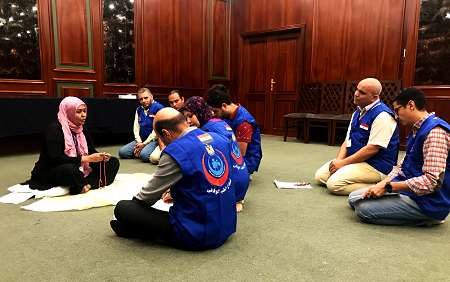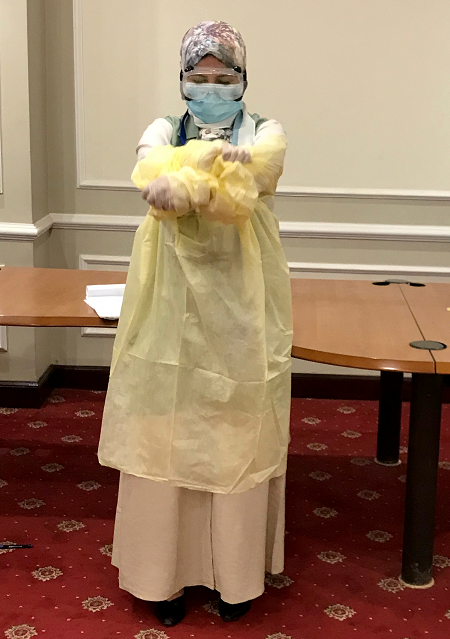The training equipped 40 participants from different departments of the Ministry of Health and Population with the necessary knowledge, tools and techniques to improve how they investigate and respond to emerging and re-emerging infections when an outbreak occurs, even when its source is unknown or ill-defined, especially during the initial period of an evolving epidemic.
 Participants taking part in the skill drill session“The training is vital to support national RRTs to intervene in outbreaks systematically, taking all safety measures into consideration,” said Dr Sherein Elnossery of WHO’s regional infectious hazard preparedness unit.
Participants taking part in the skill drill session“The training is vital to support national RRTs to intervene in outbreaks systematically, taking all safety measures into consideration,” said Dr Sherein Elnossery of WHO’s regional infectious hazard preparedness unit.
Participants were introduced to the actions to take before, during and after being deployed to an outbreak reporting area. They were provided with skills to enable them to conduct a rapid risk assessment for natural and human-made hazards. This will enable them to detect an outbreak and to apply the necessary prevention and control measures, and to effectively engage with communities in the context of outbreaks.
Hands-on practical training
The training included looking at real situations, including previous experiences from the field, and the challenges and ethical dilemmas RRTs might face during outbreaks and how to overcome them.
Different psychological aid tools were provided to the participants to be able to help the affected population and protect their own well-being during outbreaks.
The workshop included a “skill drill”, in which the teams practiced what to do during an outbreak. They were provided with a real-life scenario that included the challenges and cultural issues they might encounter.
 Safety measures were taken into consideration during the skill drill session
Safety measures were taken into consideration during the skill drill session
During the skill drill, participants followed procedures and safety measures to investigate an outbreak’s causes and to communicate with the public, the affected population and officials, in addition to reporting the findings of their investigation.
In addition to the workshop, participants are expected to further strengthen their skills and capacities in responding to outbreaks through further workshops and training conducted by the Ministry of Health and Population. As their skills are reinforced, they will then build more national RRTs.
“An extensive training plan will be developed to implement a sustainable plan to reinforce the capacities of RRTs and their individual members at the national level,” said Dr Elnossery.


